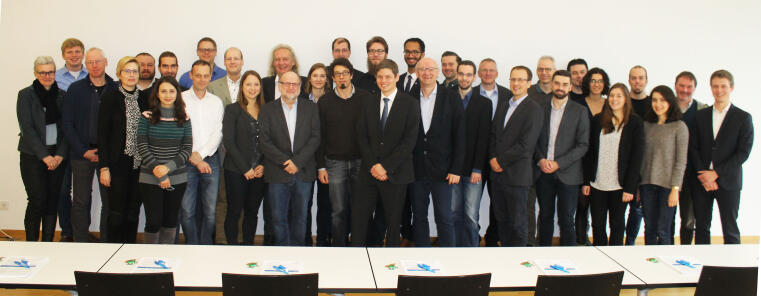Kick-Off for Research Project on Green Electrochemical Storage Systems “GrEEn”
On Monday and Tuesday, 18–19 December, the first project meeting took place for the GrEEN project at the MEET Battery Research Center in Münster. Headed by the University of Münster (WWU), working groups from the Helmholtz Institute Münster through WWU, RWTH Aachen University, and Forschungszentrum Jülich are working together for the next three years to develop electrochemical storage systems based on environmentally friendly “green” materials. They are cooperating on the project with working groups from WWU’s Faculty of Biology. The Ministry of Economic Affairs in North Rhine-Westphalia is providing € 3 million in funding for the collaborative project.

Batteries play a crucial role in the transformation of the energy sector (Energiewende). They enable vehicles to be powered by electric current instead of fossil fuels, and they could compensate for the fluctuating availability of renewable energy. However, conventional battery manufacturing processes often require excessive amounts of energy and raw materials. This is mainly because the mining and processing of many materials and components used in batteries are harmful to the environment. “This is where we come in. Over the next three years, we will investigate sustainable material, process, and systems concepts for electrochemical storage. A pioneering task for material scientists,” according to Prof. Martin Winter, scientific head of the WWU MEET Battery Research Center and founding director of the Helmholtz Institute Münster (HI MS, Institute of Energy and Climate Research 12/IEK-12 at Forschungszentrum Jülich).
The project also takes into account a sustainable life cycle of the “green” battery. In addition to material development, the recyclability and possibility of implementing environmentally friendly battery systems on an industrial scale will also be evaluated. “In addition to economic conditions, the future potential of renewable energy is particularly dependent on innovations. By placing a focus on non-hazardous substances, the project (…) is providing an important stimulus,” said minister Pinkwart, underlining the significance of the research approach upon presenting the research project with its grant notification in autumn.
At the kick-off meeting, researchers from the Helmholtz Institute Münster, Forschungszentrum Jülich, RWTH Aachen University (Institute for Power Electronics and Electrical Drives), and WWU (MEET Battery Research Center, Institute of Physical Chemistry, Institute of Inorganic and Analytical Chemistry, Institute of Biology and Biotechnology, and Institute of Business Administration) discussed their joint approaches and the project objectives.


